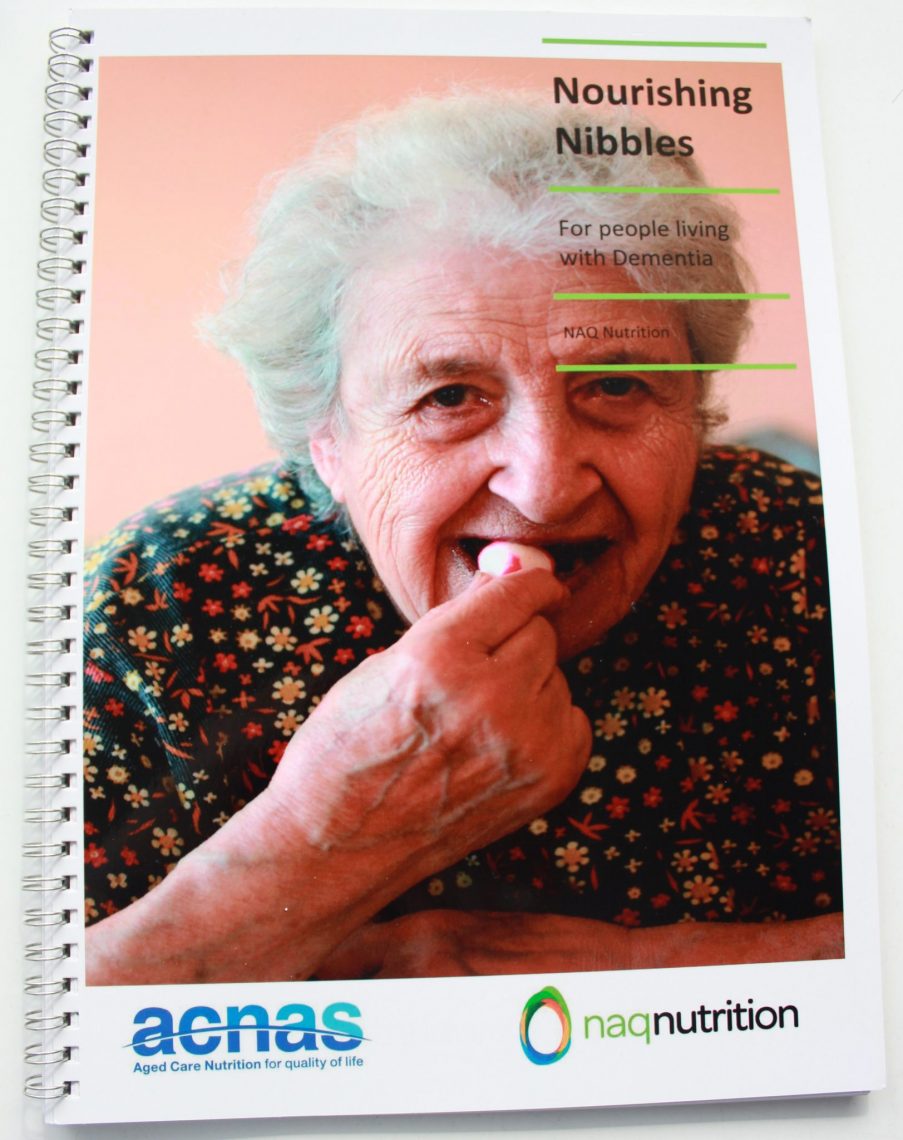Dementia & Nutrition – Managing the challenges
Dementia affects over 400,000 people living in Australia and almost 50 million people worldwide1,2.
The cognitive impairment experienced by people living with dementia can make many everyday behaviours, which are seemingly easy, become difficult. As such, mealtime problems are commonly experienced and it can be a significant challenge to maintain the nutrition and hydration status of those living with dementia.
For people living with dementia, the 5 components of eating can begin to break down.
These include:
(1) The behavioural and cognitive abilities to recognise that food is present and should be eaten.
(2) The upper extremity function to transfer food from plate to mouth.
(3-5) The oral, pharyngeal and oesophageal phases of swallowing.
The difficulty in maintaining nutritional status is often further compounded by increased energy needs as a result of wandering and increased physical activity or infections. Many of the changes that occur as part of the normal aging process also pose a challenge including the loss of teeth, shrinking gums, reduced saliva production and decreased muscle tone and jaw strength. Multidisciplinary care is therefore essential in preventing and managing nutritional status.
Long-term inadequate nutritional intake can lead to malnutrition. The consequences of malnutrition are serious and include:
- Loss of muscle mass which can further increase the loss of functional ability and leads to a greater dependence on assistance for daily activities
- Impaired immune function and increased risk of infections
- Impaired wound healing ability and increased risk of pressure sores
- Fatigue, apathy and depression
These consequences can have a significant impact on an individual’s quality of life and place a greater burden on Residential Aged Care Facilities (RACFs) or those caring for a person with dementia.
Nutrition related problems commonly associated with dementia
- Forgetting to eat and drink
- Forgetting that they have already eaten and eating again
- Eating food which is too hot
- Eating non-foods, including substances that may be dangerous
- Not recognising eating utensils or remembering how to use them properly
- Diminished sense of taste and smell
- Inability to communicate hunger
- Eating spoiled foods that have been hidden/saved in drawers or pockets
- Deterioration in ability to chew and swallow, known as dysphagia
- Refusing to wear dentures
- Paranoia
- An individual’s testimony about if or when food has been eaten becomes unreliable
- Loss of interest in food due to depression.
- Note: Often changes such as moving into a RACF can cause some depression. When the depression lifts, appetite may return.
Many or most of these factors contribute to a reduced food and fluid intake which puts individuals at risk of malnutrition and dehydration.
Mealtime management
Dementia has been identified as the second leading cause of death in Australia3. Malnutrition and dehydration are thought to be the top two causes of death in people with dementia4. Research, however, has shown that weight loss does not have to be an inevitable consequence of dementia5. By implementing problem solving strategies at mealtimes, weight maintenance is indeed possible.
Help to manage mealtimes effectively by adopting the following strategies:
- Maintain a routine and offer meals at regular times each day.
- Make meal times simple, relaxed and calm.
- Limit unnecessary noise and distractions – including turning the television off and making sure music is not too loud.
- Use plain tablecloths as heavily patterned cloths can be distracting.
- Make sure the plate and tablecloth are easily distinguishable (e.g. avoid putting white plates on white tablecloths).
- Reduce the amount of non-food items on the table.
- Remove unnecessary condiments from the table.
- Present only the cutlery for one course at a time.
- Be sure to allow enough time for a meal and avoid rushing, noting that a person with dementia may need a little longer to finish a meal.
- Remind the individual to chew well and when to swallow, if necessary.
- It is important to encourage the person to feed his or herself for as long as possible to maintain independence, strength and memory.
- If necessary, provide physical assistance by placing the utensil in their hand and then giving a verbal cue.
- If possible, demonstrate what you would like the person you are caring for to do by eating with them or encouraging family to eat with them.
- Ensure foods served are at the appropriate texture for the individual. A resident with chewing or swallowing problems (dysphagia) should be referred to a Speech Pathologist for assessment.
- Provide nutritious high energy, high protein snacks. Nourishing mid meals may help make up for a reduced intake at main meal times.
- Serving finger foods may help to improve consumption at meal and snack times (see below).

Finger foods for individuals with dementia
There is good evidence that for those living with dementia, the consumption of meals significantly increases with the introduction of more finger foods. Finger foods encourage an increased food intake by:
- Reinforcing the motion of self-feeding which promotes independent eating for longer
- Providing more acceptable and dignified options to eat with your fingers
- Giving people the freedom to choose their own food from a plate
- Providing an opportunity for confidence in one’s own decision-making to return
- Providing the chance to acknowledge and use what is still know, to recoup old learning
- Providing quick and easy nutrition for individuals who wander.
Finger foods are often considered to be pre-packaged foods such as party pies and sausage rolls. Finger foods however should provide a variety of nutrients necessary for health and wellbeing and invoke a remembered response and independence. They should be attractive to the eye, smell good, feel good and taste good.
Ask NAQ Nutrition about ordering a copy of our finger foods cookbook, ‘Nourishing Nibbles’ for people living with dementia. It includes simple recipes, both sweet and savoury, to assist carers and cooks in providing finger foods at main meals and snack times.

Caring for those in the community
The cognitive impairment experienced by those living with dementia can turn certain daily activities into rather difficult tasks. The disease does not only affect the individual with dementia, but also their relatives, many of whom are engaged in informal care. Approximately 50% of people with dementia receive care by family and friends in the community6. Research has shown that these caregivers experience difficulties when providing assistance during mealtimes and food preparation in order to maintain nutritional status and quality of life of their care recipients7,8.
A small survey of carers in the community by NAQ Nutrition found that 44% of carers were not aware that eating behaviours change in people with dementia and that they can lead to weight loss. When food intake begins to decrease it is important that this is identified early and strategies are implemented to improve intake, maintain nutritional status and prevent malnutrition. Carers need support to recognize when these mealtime management strategies are needed and how they should be implemented.
If individual help is needed a referral to an Accredited Practising Dietitian should be organised.
References
- The National Centre for Social and Economic Modelling NATSEM (2016) Economic Cost of Dementia in Australia 2016-2056
- Alzheimer’s Disease International (2015) World Alzheimer Report 2015: The Global Impact of Dementia – an Analysis of Prevalence, Incidence, Cost and Trends
- Australian Bureau of Statistics (2015) Causes of Death, Australia, 2015(cat. no. 3303.0)
- Chang, C. & Lin, L. (2005)Effects of a feeding skills training programme on nursing assistants and dementia patients. Journal of Clinical Nursing, 14,1185-1192.
- Shantenstein, B., Kergoat, M.J., Reid, L., & Chicoine, M.E. (2008) Dietary intervention in older adults with early-stage Alzheimer dementia: early lessons learned. J Nutr Health Aging, 12,461-9.
- Keller, H.H., Edward, H.G., & Cook, C. (2006)Mealtime experiences of families with dementia. American Journal of Alzheimer’s Disease and Other Dementias, 21(6), 431–438.
- Fjellström, Christina, Åsa Starkenberg, Annika Wesslen, Ann- Christine T. Bäckström and Gerd Faxen-Irving (2010) To be a Food Provider: An exploratory Study Among Spouses of Persons With Alzheimer’s Disease. American Journal of Alzheimer’s Disease & Other Dementias 25 (6): 521-526.
- Ball, L., Jansen, S., Desbrow, B., Morgan, K., Moyle, and Hughes, R. (2014) Experiences and nutrition support strategies in dementia care: Lessons from family carers Nutrition and Dietetics 72 (1): 22-29.


